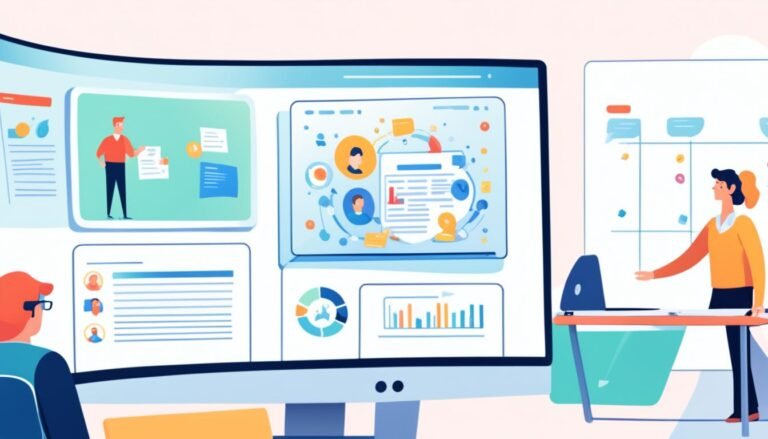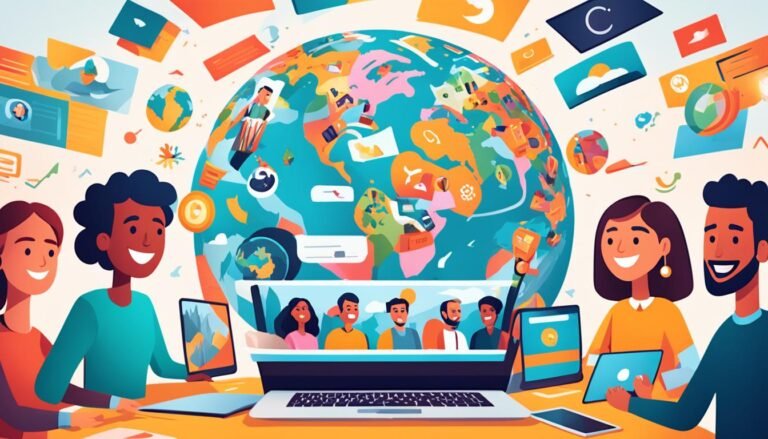Future of Work: L&D Implications in Ireland
As we approach a big change in how we work, a key question stands out: How prepared is Ireland’s workforce for the future of work? This question highlights the need for better Learning & Development (L&D) strategies. These strategies are vital for adapting to changes in the workforce, improving digital skills, and keeping up with automation trends. The use of artificial intelligence (AI) and automation is making us rethink the skills we need, showing how crucial it is to have strong L&D strategies in Ireland.
The way we work is changing fast, with more people working remotely and technology moving forward quickly. Old training methods won’t cut it anymore. Companies need to adopt new L&D strategies to keep their workers up to speed in a world driven by technology. But what are these strategies, and how can they help us navigate this new landscape?
Key Takeaways
- Only 14% of Irish adults took part in education or training in 2021, showing a big learning gap.
- 55% of adults in Ireland lack good digital skills, making it clear we need better L&D programs.
- AI and automation are pushing for new skills in the workforce.
- The Irish government wants to boost adult participation in education and training by 2030.
- Companies need to have strong L&D strategies to keep up with digital changes.
- Getting people engaged with learning can make a big difference, especially when they have career goals.
- Upskilling in specific industries and continuous learning are key to staying ahead.
Introduction to the Future of Work in Ireland
The future of work is changing fast, thanks to new tech and global trends. In Ireland, we’re not just keeping up with tech changes. We’re also building a culture that encourages learning and growth for everyone at work. This means companies need to change how they find, keep, and grow their teams.
Defining the Future of Work
Gartner says the future of work is shaped by tech, age, and social changes. These changes will affect how we work in the next ten years. The SHRM sees it as a look into how work, workers, and workplaces will change.
Deloitte points out that the future of work means changes in tech, the workforce, and the workplace. We’re talking about tech growth, climate change, global trends, changing populations, and the long-term effects of Covid-19. Paul Deane stresses the need to think about tech in a social way when planning for the future of work.
Current Trends in the Irish Workplace
Remote work is big in Ireland now, with 59% of HR leaders working on flexible work setups. Adding wellness programs can boost productivity by $3,500 per person. Companies are focusing on being flexible, offering good pay, and having strong benefits to draw in the best people.
Working on diversity and inclusion is key, with half of Irish workers seeing more inclusivity in the past three years. Training and upskilling are vital to keep up with work demands. This shows how important it is to keep learning at work. Using AI and tech in learning is changing how we work big time.
The Role of L&D in Workplace Transformation
In today’s fast-changing business world, Learning and Development (L&D) is key for transforming workplaces in Ireland. As companies move to remote and hybrid work, L&D helps employees stay adaptable and competitive.
Adapting L&D to Remote Work Trends
Remote work trends have made it vital for L&D to adapt to online settings. Now, virtual training and e-learning are common. Surveys show that 47% of leaders and 53% of business heads are focusing on tech to help employees stay agile.
Blended learning is getting popular for its flexibility and savings. Companies like Mercer have moved from in-person workshops to online, improving teamwork.
The Need for Continuous Learning Culture
With more people working remotely, it’s important to build a culture of ongoing learning. By 2027, 44% of workers will need new skills. Tailored learning experiences are key.
Strategic L&D partnerships offer customized training. Adding game elements to learning can also increase interest and motivation. This makes continuous learning a core part of a company’s culture.
The Future of Work and the Implications for L&D in Ireland
The way we work is changing fast, which means Learning and Development (L&D) in Ireland must adapt. With AI, robots, and automation on the rise, employers want to make sure their workers have the right skills. A survey found that 52% of employers see better quality in their products or services thanks to these new technologies. Also, 37% cut costs by using them.
“The growth of AI and automation doesn’t just necessitate change; it offers a unique opportunity to enhance digital literacy and future-proof our strategies,” noted a leading L&D professional from Dublin.
As new skills become more important, L&D strategies must keep up to help companies succeed. For example, 34% of employers saw more money coming in because of these technologies. This shows the value of having a workforce that can adapt and learn quickly. Companies that focus on learning tend to add more skills to their workers’ profiles.
L&D also plays a key role in solving skill gaps within companies. In the UK, nearly three-quarters of big companies and half of small and medium ones struggle with technology skills. Ireland needs to focus on making its workforce more digitally literate. The European Commission is investing about €1.9 billion in the Future of Work, including research and innovation.
Understanding what the future holds for work in Ireland means looking at big trends like technology, climate change, and changes in the workforce. The COVID-19 pandemic has sped up the use of technology and brought in new ways of working. This shows how important it is to have strong L&D plans.
| Benefits of AI, Robots, and Automation | Percentage of Employers |
|---|---|
| Improved Quality of Goods or Services | 52% |
| Reduced Costs | 37% |
| Increased Revenue | 34% |
By focusing on digital skills and strong L&D strategies, employers can tackle the challenges of the changing work world. This approach is key to upskilling the Irish workforce and ensuring success for companies in the long run.
Upskilling Workforce and Enhancing Digital Literacy
In Ireland, upskilling is key to tackling the skills gap and getting workers ready for the future. In 2021, only 14% of adults in Ireland were learning new skills, which is lower than in Sweden and Finland. This shows we need to focus more on teaching digital skills to our workers.
Improving digital skills isn’t just about old-school training. It’s about using technology to learn and creating strong digital skills plans. Ireland is not doing as much lifelong learning as the EU average of 11%. With the fast pace of digital changes, we need to act fast to keep up.
- Investment in Future Skills: OECD Secretary-General Mathias Cormann says we need big investments in skills and management skills.
- Collaborative Efforts: Working together between government, schools, employers, and workers is key to closing the skills gap.
- Lifelong Learning Culture: Making lifelong learning a big part of our lives is important for our careers and the economy.
Enterprise Ireland’s Spotlight on Skills program shows how to focus on the right skills for employers. By working together on L&D for future skills, Ireland can stay ahead in a changing world. This will help our workers keep up with digital changes.
Leveraging Data to Inform L&D Strategies
In today’s world, using L&D analytics is key for making smart learning and development (L&D) plans in Ireland. By understanding the data, companies can make their L&D programs fit the changing needs of their workers. This ensures that every training program supports the company’s main goals.
Importance of Data-Driven L&D Decisions
Decisions based on data are vital for seeing how training affects business success. The 2020 LinkedIn Workplace Learning report showed many UK L&D experts were planning to improve skills to fill gaps. At the same time, 38% of companies were cutting budgets for in-person training to invest more in online learning. This change was sped up by the pandemic, showing the need for data to guide L&D strategies.
In Ireland, the use of digital learning jumped to 57% in 2020 from 29% in 2015. This shows how important data analytics is for leading L&D efforts.
Using AI and Automation in L&D
Even though AI in corporate learning is still rare, it has huge potential for improving professional development. Only 5% of learning pros surveyed by CIPD were using AI, but 6% were planning to start soon. Generative AI, which started in late 2022, changes the game by making content that fits learners better, boosting engagement and keeping learners interested.
AI avatars and chatbots also offer real-time help and interactive learning, making training more efficient on a large scale.
Automation in professional development can make things run smoother, cut costs, and free up time for more important tasks. Chatbots give immediate help, while AI avatars make learning more engaging. By using AI and automation, companies can make their L&D programs better and more efficient. This makes ongoing skill development easier and meets the needs of today’s work environments.
Source Links
- 2024 Workplace Learning Report | LinkedIn Learning
- Transforming the Irish Workplace with Learning and Development
- Introducing the Future of Work: Key Trends, Concepts, Technologies and Avenues for Future Research
- HR Trends and Challenges in Ireland: 2024 Guide
- The Evolving Role of Learning in Workforce Transformation
- Trends shaping the future of learning and development
- CIPD | Technology and the Future of Work | Factsheets
- Skills Gap in Ireland: Urgent Need for Lifelong Learning and Upskilling – IMI
- CIPD | Skills Development in the UK Workplace | Factsheets
- Digital Learning: A Bright New Dawn for Learning and Development
- CIPD | Evidence-based L&D – The gift of artificial intelligence








